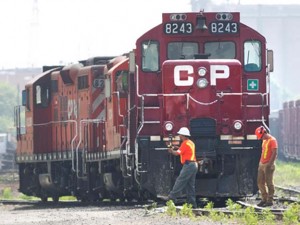Canadian government officials are hoping to have the trains running again by as early as Thursday now that legislation has been put before parliament to order a halt in a strike by thousands of Canadian Pacific Railway workers.
CP operates nearly 15,000 miles of track in the U.S. and Canada, much of it serving the industrial portions of Ontario, as well as much of the American Midwest. So, the walkout has already begun to have a severe impact on Detroit’s Big Three and a number of foreign-owned makers, including Honda, which heavily depend on the railroad to supply plants with parts and then ship finished vehicles to dealers across North America.
“The strike can’t go on,” Labor Minister Lisa Raitt told Parliament during a heated session in the Canadian capital of Ottawa. “We need to get the trains running again.”
The railroad and workers have not completely broken off talks but appear stalled on a variety of issues, including pensions, work rules and fatigue management. Complicating matters, Canadian Pacific has been locked in a bitter battle with an activist investor that led to the forced departure of its CEO Fred Green earlier this month.
A total of 4,800 conductors, engineers and other CP workers have been manning picket lines since May 23rd. And the likelihood of their being forced back to work has generated strong controversy across Canada. The bill in parliament would lead to a maximum 90-day cooling-down period that could then result in mandatory arbitration.
Prime Minister Stephen Harper’s government has estimated the financial impact of the strike at as much as C$540 million a week – US $530 million. The Conservatives have also forced workers back on the job following strikes at Canada Post and Air Canada, much to the chagrin of their opponents, who feel Harper is pressing to crush the country’s unions.
“Today we are seeing the shafting of the CP workers, and I say shame on the government for not believing in the importance of free collective bargaining,” said Liberal Party lawmaker Kevin Lamoureux.
But adding to the pressure for a resolution is the fact that the strike’s impact is being felt on both sides of the border. Much of the track operated by CP is located in Michigan and other parts of the American Midwest. Key U.S. clients include all three of the Detroit-based automakers.
But CP also moves over half of Canada’s potash, wheat and coal, the Mining Association of Canada expressing “grave concern” if the walkout were to continue.

